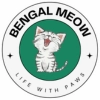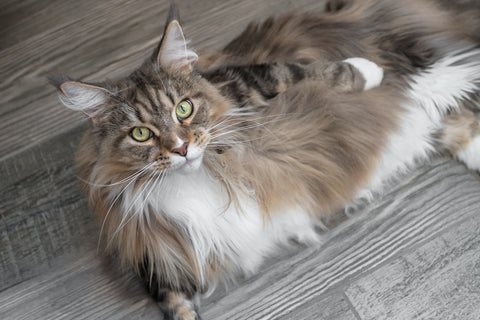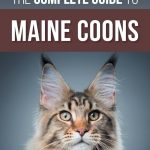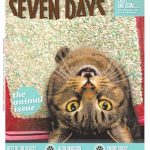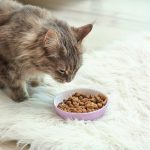Maine Coon Cat Age: Unveiling the Secret to Longevity
The average age of a Maine Coon cat is around 12 to 15 years. These cats were believed to have originated from six Turkish Angora cats brought to Maine, USA, aboard Marie Antoinette’s ship during the French Revolution.
When they reached land, the Angora cats mated with local short-haired cats, resulting in the creation of the Maine Coon breed we know today. This breed is known for its large size, friendly temperament, and sociability. Maine Coons are highly intelligent and are great companions for families, children, seniors, and other pets, including dogs and cats.

Credit: pathonsetu.com
History And Origins Of The Maine Coon Cat
When it comes to the history and origins of the Maine Coon cat, there are many fascinating stories and legends surrounding this beloved breed. One such legend is that of Marie Antoinette and the Turkish Angora cats.
The Legend Of Marie Antoinette And The Turkish Angora Cats
According to popular folklore, during the French Revolution, Marie Antoinette attempted to escape France on a ship. She supposedly brought along six Turkish Angora cats, her beloved companions, for the journey. However, the ship never made it to its intended destination, and instead landed in Maine, where the cats disembarked and mingled with the local population of short-haired cats.
Breeding With Local Short-haired Cats
After their arrival in Maine, these Turkish Angora cats began to breed with the local short-haired cats, resulting in a unique and distinctive hybrid breed that eventually became known as the Maine Coon cat. The traits and characteristics of the Turkish Angora cats, such as their long, silky coats and tufted ears, were passed down to subsequent generations, contributing to the creation of the modern Maine Coon.
Development Of The Modern Maine Coon
Over time, through natural selection and selective breeding, the Maine Coon cat developed specific features that allowed it to adapt and thrive in the harsh New England climate. Their large size, heavy fur coats, and tufted paws made them well-suited for surviving the cold winters and hunting in challenging conditions. These qualities, combined with their friendly and sociable nature, made the Maine Coon a beloved companion and a popular breed among cat enthusiasts.
Today, the Maine Coon continues to captivate cat lovers with its distinct appearance, gentle temperament, and rich history. From its humble beginnings as the offspring of Turkish Angora cats and local short-haired cats, the Maine Coon has become a unique and cherished breed that embodies the spirit of Maine. Whether as a beloved family pet or a show cat, the Maine Coon’s legacy lives on.
Maine Coon Cat Characteristics And Personality
The Maine Coon is a majestic breed known for its unique characteristics and friendly nature. These cats have a
Large Size And Robust Build,
making them one of the largest domesticated cat breeds in the world. With their muscular bodies and strong bone structure, Maine Coons have a regal presence that sets them apart from other feline companions.One of the most endearing qualities of Maine Coon cats is their
Friendly And Sociable Nature.
They are renowned for their affectionate behavior and love being around people. Maine Coons are known to be great companions and enjoy the company of their owners, making them perfect pets for families and individuals alike.Another remarkable aspect of Maine Coon personality is their
Playful And Intelligent Temperament.
These cats have a knack for interactive play and are often found engaging in activities that challenge their minds. Maine Coons are quick learners and can be easily trained to perform tricks or solve puzzles. Their intelligence and curiosity make them a delight to be around as they constantly seek new experiences and adventures.In summary, the Maine Coon breed is characterized by its large size, friendly nature, and playful intelligence. These cats are truly one-of-a-kind companions, offering endless joy and entertainment to their owners.
Factors Affecting Maine Coon Cat Longevity
When it comes to the lifespan of Maine Coon cats, several factors play a crucial role. These factors can significantly impact how long a Maine Coon cat lives and ensure their overall health and wellbeing. Understanding these factors is essential for cat owners to provide the necessary care and make informed decisions for their beloved feline companions.
1. Genetics And Hereditary Conditions
Genetics plays a vital role in determining the lifespan of a Maine Coon cat. Like any other living being, Maine Coon cats inherit certain genetic traits from their parents, including the potential for hereditary conditions that can affect their overall health and longevity. It is essential to obtain a Maine Coon kitten from a reputable breeder who emphasizes genetic health testing and strives to breed cats with healthy genetic backgrounds.
2. Nutritional Needs And Diet
The diet of a Maine Coon cat directly impacts their overall health and lifespan. Providing a balanced and nutritious diet is crucial to ensuring their longevity. Maine Coon cats are known for their large size and active lifestyle, which requires a diet high in protein and essential nutrients. Feeding them a high-quality cat food that meets their specific dietary needs is vital. Consult with a veterinarian to determine the best diet plan for your Maine Coon cat based on their age, weight, and any unique health considerations.
3. Exercise And Mental Stimulation
Regular exercise and mental stimulation are key factors in maintaining the health and longevity of Maine Coon cats. These cats are active and playful by nature and benefit from activities that keep them physically and mentally engaged. Providing them with interactive toys, scratching posts, climbing trees, and playtime sessions can help fulfill their natural instincts and prevent behavioral issues. Engaging in regular exercise and play sessions also promotes a healthy weight, reduces the risk of obesity-related health problems, and contributes to a longer lifespan.
4. Regular Veterinary Care And Vaccinations
Regular veterinary care is essential for maintaining the health and longevity of Maine Coon cats. Routine check-ups, vaccinations, and preventive care measures can help detect and prevent any potential health issues early on. Vaccinations protect against common feline diseases that can be life-threatening. Additionally, regular veterinary visits allow for early detection of any signs of illness or underlying conditions, ensuring timely treatment and improving the cat’s prognosis.
In conclusion, understanding the factors that affect Maine Coon cat longevity is crucial for cat owners. By prioritizing genetics, providing a balanced diet, ensuring regular exercise and mental stimulation, and maintaining regular veterinary care, owners can help their beloved Maine Coon cats live long, healthy lives.
Best Practices For Ensuring A Long And Healthy Life For Your Maine Coon Cat
Maine Coon cats are known for their impressive size, striking appearance, and friendly personalities. These gentle giants can live a long and healthy life with proper care and attention. By following a few best practices, you can ensure that your Maine Coon cat stays happy and thriving for years to come.
High-quality Nutrition And Balanced Diet
Proper nutrition is essential for the overall health and well-being of your Maine Coon cat. Providing a high-quality, balanced diet that meets their nutritional needs is crucial. Ensure that the cat food you choose is specifically formulated for Maine Coons or large breeds, as these cats have unique dietary requirements.
- Feed your cat a diet that includes high-quality protein, such as chicken or fish, to support their muscle development and maintenance.
- Include essential fatty acids, like omega-3 and omega-6, to promote healthy skin and a lustrous coat.
- Ensure that the cat food is free from artificial preservatives, flavors, and colors.
- Provide fresh water at all times, and consider using a pet fountain to encourage hydration.
Regular Exercise And Enrichment Activities
Maine Coon cats are active and playful by nature, so regular exercise is essential to keep them physically and mentally stimulated. Engaging your cat in regular play sessions and providing enrichment activities can prevent obesity, promote muscle development, and enhance their overall well-being.
- Set aside dedicated playtime each day to engage your Maine Coon in interactive play with toys, such as feather wands or catnip-filled mice.
- Provide climbing structures, scratching posts, and window perches to satisfy their natural instinct to climb and explore.
- Rotate toys and introduce new ones periodically to keep your cat mentally engaged and prevent boredom.
Grooming And Hygiene Practices
Maine Coon cats have a semi-longhaired coat that requires regular grooming to keep it healthy and tangle-free. Establishing a grooming routine from an early age can help your cat become familiar with the process and ensure that grooming sessions are stress-free.
- Brush your Maine Coon’s coat at least once a week to remove loose hair and prevent matting.
- Trim their nails regularly to prevent them from becoming too long and causing discomfort or injury.
- Clean their ears and check for any signs of infection or irritation.
- Brush their teeth regularly or provide dental treats to maintain good oral hygiene.
Monitoring For Signs Of Illness Or Discomfort
While Maine Coon cats are generally healthy breeds, it’s important to monitor them for any signs of illness or discomfort. Early detection and prompt veterinary care can significantly improve their chances of recovery.
- Observe changes in appetite, litter box habits, or behavior that may indicate an underlying health issue.
- Check for any unusual lumps, bumps, or skin irritations during grooming sessions.
- Pay attention to changes in weight, coat condition, or energy levels.
Regular Veterinary Check-ups And Vaccinations
Regular veterinary check-ups are crucial for maintaining your Maine Coon’s health and preventing potential diseases. Schedule annual wellness exams and ensure that your cat is up to date on vaccinations and preventative treatments.
- Consult with your veterinarian to establish a vaccination schedule that meets your Maine Coon’s specific needs.
- Discuss appropriate flea, tick, and heartworm prevention methods to protect your cat.
- Follow your veterinarian’s recommendations for spaying or neutering your cat to prevent reproductive health issues.
By following these best practices, you can provide your Maine Coon cat with a long and healthy life full of love and happiness. Remember to consult with your veterinarian for personalized advice and recommendations based on your cat’s individual needs.
Common Health Issues In Maine Coon Cats And How To Address Them
Maine Coon cats are known for their large size, friendly nature, and long lifespan. However, like all cats, they are prone to certain health issues. Being aware of these common health concerns and knowing how to address them can help ensure that your Maine Coon cat lives a long and healthy life.
Hypertrophic Cardiomyopathy (hcm)
One of the most common health issues in Maine Coon cats is hypertrophic cardiomyopathy (HCM), a condition that affects the heart muscles. It is important to regularly monitor your Maine Coon cat’s heart health and watch out for any signs of HCM, such as difficulty breathing, coughing, or fainting. To address this health issue, it is recommended to have regular check-ups with your veterinarian and to ensure that your cat follows a healthy diet and gets enough exercise.
Hip Dysplasia
Another common health issue in Maine Coon cats is hip dysplasia, a condition that affects the hip joints. This condition can cause pain and difficulty in mobility for your cat. To address hip dysplasia in Maine Coon cats, it is important to provide them with a comfortable and supportive environment. This may include providing soft bedding and avoiding excessive jumping or climbing. If your cat develops hip dysplasia, your veterinarian may recommend treatments such as pain medication or physical therapy.
Polycystic Kidney Disease (pkd)
Polycystic kidney disease (PKD) is a genetic disorder that is common in Maine Coon cats. This condition causes the formation of cysts in the kidneys, which can lead to kidney failure. To address PKD, it is important to regularly monitor your cat’s kidney health through regular check-ups and blood tests. Your veterinarian may also recommend a special diet and medications to manage the symptoms of PKD.
Obesity And Weight Management
Maine Coon cats are prone to obesity, which can cause a range of health issues. To address obesity in Maine Coon cats, it is important to monitor their diet and ensure they are getting enough exercise. Provide a balanced diet that is appropriate for their age, weight, and activity level. Encourage regular playtime and engage in interactive activities to keep them physically active and mentally stimulated. If necessary, consult with your veterinarian for a personalized weight management plan for your cat.
Dental Care And Oral Hygiene
Dental issues are common in Maine Coon cats, including gingivitis, periodontal disease, and tooth decay. To address these issues, it is important to maintain good dental care and oral hygiene for your cat. This includes regular brushing of their teeth, providing dental-friendly treats and toys, and scheduling regular dental cleanings with your veterinarian. Regular check-ups with your veterinarian can help identify any dental issues before they become serious.
Frequently Asked Questions For Maine Coon Cat Age
Can Maine Coons Live For 20 Years?
Maine Coons can live up to 20 years, making them one of the longest-lived cat breeds.
How Many Years Does A Maine Coon Cat Live?
The average lifespan of a Maine Coon cat is around 12 to 15 years.
Is 13 Old For A Maine Coon Cat?
A 13-year-old Maine Coon cat is considered to be old. Maine Coons typically have a lifespan of 12-15 years.
Conclusion
The Maine Coon cat age can vary depending on various factors such as genetics, diet, and overall health. On average, Maine Coons can live between 12 to 15 years, and some have even been known to live up to 20 years.
These cats have a unique history and have become beloved pets for their friendly and sociable nature. Taking proper care of your Maine Coon, including regular check-ups, a balanced diet, and plenty of exercise, can help ensure they live a long and healthy life.
